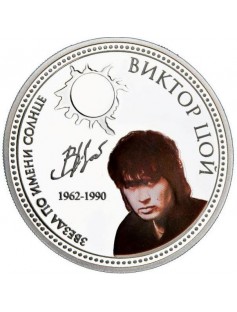- Extremly low mintage limit, only 1962
- VERY RARE COIN
- Coin in capsule + with Certificate of Authenticity + BOX
Viktor Robertovich Tsoy was born in 1962 to a Korean father and Russian mother in Leningrad. He is regarded as one of the pioneers of Russian rock and has a huge following in the countries of the former Soviet Union even today.
He began writing songs at 17. His early lyrics discussed themes like life on the streets of Leningrad, love and hanging out with friends. Many heroes in his songs were young men trying to survive in a tough world.
At 18, Tsoy was expelled from the Serov Artistic Academy. The reason for the expulsion was "poor grades" but it didn't help that he was heavily involved in the rock scene. By this time Tsoy had began to perform the songs he wrote at parties. During one of these performances he was noticed by Boris Grebenshchikov, a member of the established rock group "Aquarium."
Grebenshchikov took Tsoy under his wing and helped him start up his own band. Leningrad's Rock Club, the only club in the USSR where rock bands were allowed to play. It was at the club's First Annual Rock Concert that Viktor Tsoy made his stage debut. He played solo but with the support of two Aquarium members. Tsoy's innovative lyrics and music impressed the crowd.
Before making it big, Tsoy said that the problem with music was that no one wanted to take chances. He wanted to experiment with lyrics and music in order to create something fresh that no one had ever heard before. Tsoy succeeded in his goal. Shortly after the concert he recruited other musicians and they formed Kino which in Russian means "cinema." They recorded a demo tape at Tsoy's apartment. This tape was quickly passed around Leningrad and then all over the country by rock enthusiasts. Kino began to gain a following.
In 1982 Kino released their first album entitled "45". The album confirmed Tsoy's willingness to address political topics in his music, something not many other artists were prepared to do. In his song "Elektrichka" (Russian for suburban commuter train), he discussed a man stuck on a train that was taking him where he didn't wish to go; this was clearly a metaphor for life in the Soviet Union and the band was quickly banned from performing this song live. The political message of the song made it popular among the youth of the anti-establishment movement that now began to look to Tsoy and Kino as idols.





